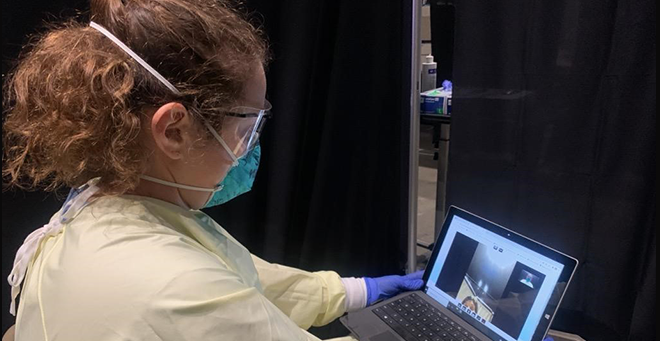A new companionship wellness initiative at UMass Medical School is combating isolation and loneliness among COVID-19 patients 65 and older by having students virtually check in, comfort and emotionally support them at two Worcester hospitals.

Funded by a year-long grant from the Remillard Family Community Service Fund, the program has recruited 85 School of Medicine and Graduate School of Nursing students to hold secure video call visits with older adults admitted for COVID infection to the DCU Center Field Hospital and UMass Memorial Medical Center Memorial Campus. Students will routinely check in with patients via tablet, validating concerns and providing a listening ear.
“At this time, patients aren’t allowed to have visitors. This can have an impact on mental health, especially for someone in this vulnerable population,” said Hannah Mills, FNP, DNP student and program co-leader. Mills is a bedside nurse and is undertaking this initiative as her DNP scholarly project. “By utilizing technology, we can connect these patients to students who want to make a difference in their lives.”
Adarsha Bajracharya, MD, assistant professor of medicine, program creator and co-leader, said hospital volunteers provide an invaluable service that is beneficial for patients as well as the clinical team.
“We have recognized the anxiety in older adult patients as COVID-19 places them in quarantine,” said Dr. Bajracharya. “They are surrounded by a lot of unknowns while being alone, and the doctors and nurses are centered on the patient’s medical status. In a time like this, patients need someone to talk to and divert their thoughts from the clinical heaviness. Patients look forward to having this kind of conversation daily so they can have a lightened stay at the hospital.”
GSN and SOM students will have the opportunity to engage with patients of various backgrounds, including those whose primary language is not English. The role of the volunteer is to offer emotional support to patients, as well as open up dialog about questions and concerns that are not related to their clinical course. The frequency of the discussions is at the discretion of the patient and volunteer.
“This all stems from a common observation of how patients lacking in connections suffer a bit more in a hospital setting,” said Alice Kennedy, SOM ’23 and program co-leader. “It’s a concrete way that students can help as much as possible and interact on a personal level.”
Staff say the urgency of this issue is growing, as patients deal with limited human interaction.
“As we deal with another round of increased cases, we are uniting to provide compassion toward our community,” said Jean Boucher, PhD, RN, ANP-BC, associate professor of nursing and director of the DNP program and volunteer program co-leader. “This speaks to the need to foster geriatric-friendly, caring environments in the hospital. By being cognizant of the need in a clinical as well as emotional manner, we can contribute to a more positive patient experience.”
The team hopes to expand this program beyond a year to include more COVID units in the area, depending on the status of the pandemic. While this program will focus on the wellbeing of older patients, it also provides students the opportunity to participate in unique training while they are on the road to becoming medical and nursing professionals.
“Our goal is to provide the best experience, not just for these patients, but also for the student volunteers who enthusiastically volunteered for this. We want a positive experience for every member who connects to this project,” said Bajracharya.
“Being a part of this program allows me to practice with leadership skills and working on an interdisciplinary team. We are able to put our minds together with different perspectives of medicine towards a common mission,” said Mills.
Click below to watch the WCVB/TV report on the program
Program unites medical students in training with lonely hospital patients
Related stories on UMassMed News:
Remillard Family Community Service Fund awards eight grants to faculty and students
Local clinics using telehealth to consult with patients; medical students provide training
UMMS students produce hand sanitizer for nearby hospitals amid COVID-19 pandemic